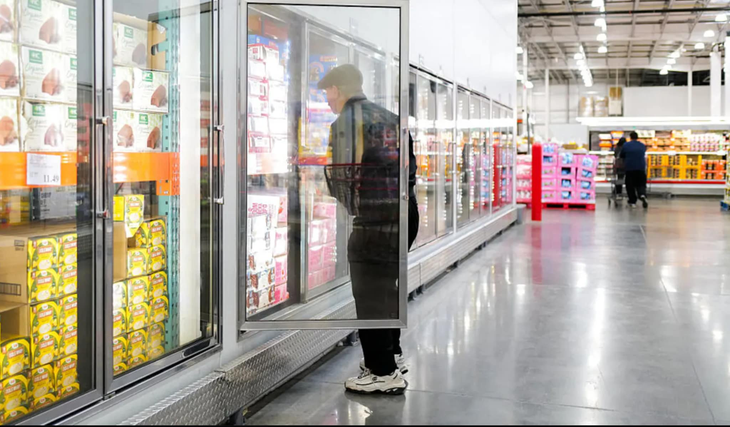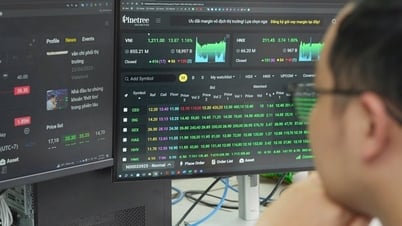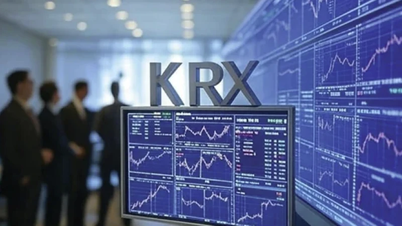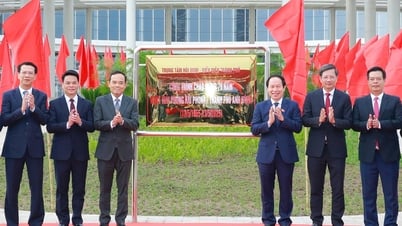
A consumer shops in Bayonne, New Jersey (USA) - Photo: AFP
The series of tariffs imposed by US President Donald Trump on imported goods from many countries, especially China, has forced many US businesses to find ways to "absorb" or, ideally, avoid the increased costs that eat into profits.
Tax transfer to consumers
The Trump administration has so far raised tariffs on Chinese imports by a total of 145%.
In retaliation, China also raised tariffs on imports by up to 125% in just two weeks.
As noted by CBS, many American businesses, from small businesses to famous domestic brands, have announced product price increases or warned consumers that prices will increase soon, citing President Trump's tariffs.
Reflecting this trend, a recent survey of 400 US business leaders by research firm Zilliant found that 44% of them plan to pass on the cost of the tax to consumers.
Responding to CNBC, Amazon CEO Andy Jassy expected the tax to make a series of consumer goods more expensive, as many sellers on this e-commerce platform are likely to increase prices to compensate for the difference in import tax costs.
Some major manufacturers have also said outright that they won’t absorb the cost increase. Last month, a senior executive at chipmaker Micron said some of its products would be subject to higher tariffs imposed by the US on China, Canada and Mexico, and that Micron planned to “pass those costs on to our customers.”
Honeywell Building Automation, which designs safe and efficient systems for buildings, began charging a 6.4 percent “tax surcharge” for its building management systems in early March. Honeywell said the move was necessary “to minimize the impact of the tax,” and assured that it would eliminate the fee “as soon as the taxes are no longer in effect.”
US technology consumers are likely to be hit hardest by the tariffs, as smartphones are the top US import from China, followed by laptops.
The Consumer Technology Association estimates that tariffs of 60-100% on all imports from China could cost American consumers 46-68% more on laptops and tablets.
Along with that, prices of devices such as game consoles could increase by 40-58% and prices of smartphones could increase by 26-37%.
Moving factories takes years!
Author Aditya Jain, in a post on the Institute for Supply Management website (USA), suggests a "wait and see" approach that seems reasonable for businesses in the current uncertain times.
Mr. Jain advised that companies can use the current US-China trade war as a reason to review their supply chains and form alliances to protect US economic and security interests.
Amid rising tariffs between the US and China, CEO Tony Post of US-based Topo Athletic Shoe Company said he is planning to work more with suppliers based in Vietnam, in addition to current suppliers in China.
However, the issue of shifting the supply chain is said to be very complicated and time-consuming. As in the case of Apple, the supply chain of this leading smartphone company in China is too large and too complicated.
Apple is exploring ways to move some iPhone production to the United States, but that could take years, a source familiar with the matter told CNBC.
“Investments in factories, once made, cannot be easily or immediately reversed… Moving those factories to another location will take several years,” said Arthur Dong, professor of economics and strategy at Georgetown University.
Mr. Trump has suspended reciprocal tariffs with most countries for 90 days, which is a relief but still raises concerns for businesses like Illinois-based home appliance company Honey-Can-Do International.
"The pause allows us to continue business as usual outside of China, but we can't make any long-term plans. It's hard to know how to pivot because we don't know what's going to happen in 90 days," CEO Steve Greenspon said.
In addition to American companies, many European businesses operating in China are also concerned that they could be caught up in the trade war between China and the US. The production activities of these businesses in China are also largely exported to the US.
Accordingly, the German automobile group Volkswagen in China emphasized in a statement on April 10 that they are implementing a consistent strategy of "In China, for China". Volkswagen in China will accordingly strengthen its local development capacity in many areas.
Tesla's move
According to SCMP, Tesla, affected by the US-China tariff war, has decided to stop accepting orders to ship Model S and Model X electric vehicles (EVs) to China.
Citing sources, SCMP said Tesla has stopped taking orders for its US-made models, instead persuading customers to consider buying Model Y and Model 3 models manufactured at its Gigafactory near Shanghai.
Source: https://tuoitre.vn/doanh-nghiep-cac-nuoc-ung-pho-thue-tra-dua-qua-lai-cua-trung-quoc-va-my-20250413064543478.htm







![[Photo] National Assembly Chairman Tran Thanh Man attends the Party Congress of the Committee for Culture and Social Affairs](https://vphoto.vietnam.vn/thumb/1200x675/vietnam/resource/IMAGE/2025/5/11/f5ed02beb9404bca998a08b34ef255a6)














![[Photo] National Assembly Chairman works with leaders of Can Tho city, Hau Giang and Soc Trang provinces](https://vphoto.vietnam.vn/thumb/1200x675/vietnam/resource/IMAGE/2025/5/11/c40b0aead4bd43c8ba1f48d2de40720e)
![[Photo] Discover the beautiful scenery of Wulingyuan in Zhangjiajie, China](https://vphoto.vietnam.vn/thumb/1200x675/vietnam/resource/IMAGE/2025/5/11/1207318fb0b0467fb0f5ea4869da5517)

































































Comment (0)